When I came to the USA in 2008 for the first time, I was in so-called ‘honeymoon stage’: Everything was new and exciting. Even my jet-lag. I was ready to explore, meet new people, eat new food, buy new clothes. However, after about a month, I started to feel frustrated, lonely and tired. Everything was so different that learning curve was painful. So many things that I had to figure out ‘by myself’ and when I couldn’t figure it out, there was no one to cry to.

In this post, I would like to share with you the things I wished I had known before I arrived. Although I believe that learning these by experiencing on your own would be challenging but fun, also I know that a lot of people eventually go back to their countries because they can’t cope with these challenges by themselves, especially in the first critical 1-3 months. Statistics say that around 34% of all new college students will drop out in the first year. One of the main reasons is homesickness.
If you want me to define ‘homesickness’, it is not just missing your parents or best friends. It is losing the sense of ‘belonging’, also the fear of the ‘unknown’ and lacking the strength to fight with ‘problems’ as they hit hard one after another. I remember one day I missed the bus to school which was running every 30 min. I was running late for the class, so I had to walk to the class in snow. But half way to the school, I realized that my cute looking boots that I bought from Turkey were not suitable for snow. By the time I arrived my class, my socks were soaked in snow water. The very same day I learned that for my thesis, I needed to go on a field trip and camp for at least 40 days. The problem was, I hadn’t had a car or driver’s license at that time, I hadn’t camped in wild at all, not even for one day. Then of course in the evening I felt sick because of the cold and I remember shivering and thinking to myself: If I die here, nobody will know. I’m so alone.

Now, let’s talk about the most important things before you move to the USA:
CULTURE SHOCK, HOMESICKNESS AND HOW TO DEAL WITH THEM
As I mentioned, it was very difficult for me to adapt the host culture. It took me 5-6 months to start feeling normal. I was home all the time, watching movies and doing homework. I wanted to make friends, go out and explore. But I needed a car to go anywhere in Kansas and it was too hard to make friends. Americans seemed like they were communicating among themselves very effectively and confidently. Yet, I felt like I was left outside. Masters students at Geology department were doing projects together, were going to a bar (Henry’s in Lawrence, KS to be exact) every weekend but nobody was inviting me. That made me feel rejected… How was this even possible? The social butterfly in Turkey (me) had turned into a caterpillar.
Then, we went to this Spain field trip. I was staying with 5 other friends in the same hotel room. We finally started talking about things that are different than geology. We went out at night and we chat about everything. We were laughing, dancing. The whole week we spent in Almeria, Spain, I had gained a part of me back. I thought to myself “I’m still lovable and respectable”. After we returned to KS I joined their gatherings a lot more. When I confessed that I was waiting for an invitation, they were puzzled. They asked me why I waited for an invitation. They said they were discussing about where to go right in front of me, that meant I was automatically invited! Oh boy, how could I know that?!
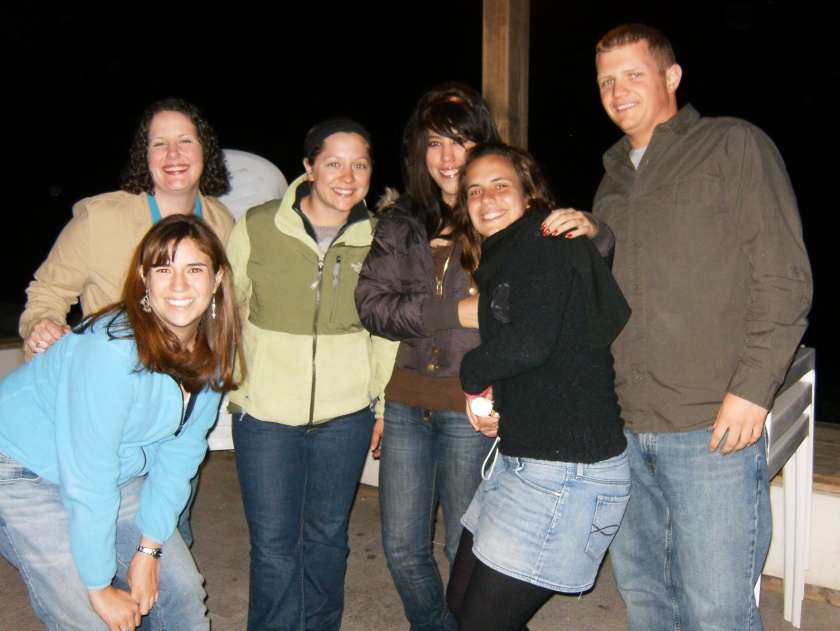
Then as I read about it, I realized that it wasn’t only me! There was a science behind it. They mapped the psychological ups and downs. Now, you can learn about it too here and I hope that it will help you during your journey.
Below is a chart that shows the stages of adaptation process to a host culture:
During the first stage, Anticipating Departure, you go through mixed feelings. You are anxious about leaving your family and friends behind. You are trying to be excited but the fear of the unknown still makes you feel on edge.
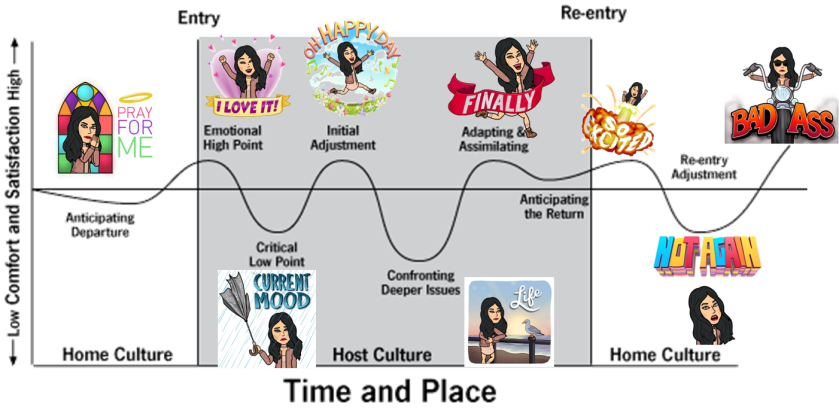
Upon entering the new country, your excitement will be at its top level. This level is called ‘Honeymoon Stage (Emotional High Point)‘. This stage lasts about 1-3 months. Everything is new, there are so many things to explore, so many things to take picture of, to taste and to smell. I still remember the smell of the BBQ sauce on the first ribs that I tried. And the taste of fried pickles. The smell of Britney Spears perfume (There were so many cheap perfumes everywhere). Also, I remember taking a picture of birds and bugs. They looked and sounded different. At this stage, I was like a tourist and I was enjoying it!
Then comes the Critical Low Point. This was the time when I first realized that I didn’t have anyone to share this excitement with. This was the period that I realized, in order to buy a toothpaste or a loaf of bread, I had to drive to Walmart which is 10 minute drive from home. There was a little problem though: I didn’t have a car. I didn’t even have a drivers license. Then I realized my masters program was way different than what I was expecting (It is way different than Turkish education). So much homework, so many lab and field reports. Proposal, poster presentation, application for scholarships and funding, everything had strict deadlines. Besides, my adviser was horrible, so it didn’t help my adaptation process at all. I remember crying in front of her once. I truly think she didn’t care.
Then comes the ‘Initial Adjustment‘. When I met my Turkish neighbors, Fatih abi and Zeynep Abla, I felt so happy, they were letting me borrow their car so that I could do groceries whenever I wanted. I had figured out the school’s system better, so I was finally meeting the deadlines and I was made aware of the danger called ‘plagiarism’ (please read more about it here: http://www.plagiarism.org/article/what-is-plagiarism). On the Spain trip I mentioned earlier, I had gotten closer with my American friends, I had joined ISA (International Student Association) which was the best decision I have ever made. In this organization, I met so many international students who were going through the same stages as me. This was such a good relief. Besides, we were having so much fun while we were learning about each other’s cultures. For the very first time, everything seemed to be working… Until the next stage…
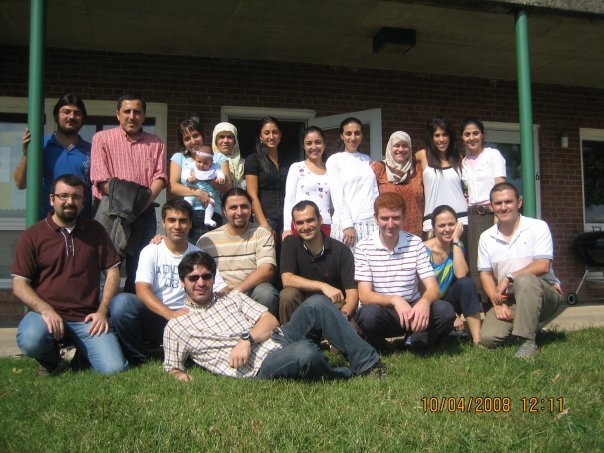
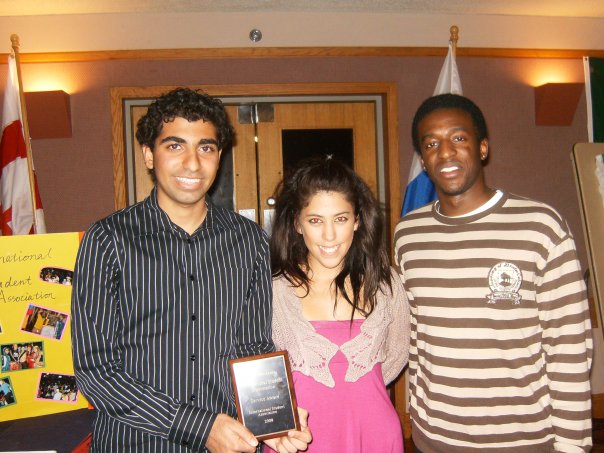
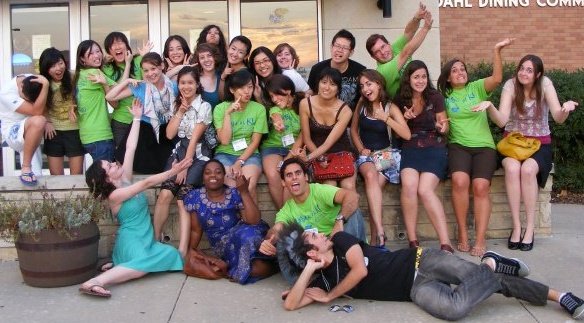
‘Confronting Deeper Issues‘ is an interesting stage. Because this is the stage after which you decide to stay or go back. Also, if you decide to stay, this is the stage that will make you more mature than ever. This is the time period that your communication with your home country gets little disrupted: Some friends of yours stop talking to you, or they get really busy with their own lives that they become not as available as they were before to chat. Suddenly when you look around, you see that you are living in a dorm or in an apartment with used furniture, your school work is a constant struggle, you are still trying to figure things out: You are trying to understand why your new friends are not checking in even though they know that you are sick. You are still trying to figure out how to open a bank account and call the bank when a problem arises. You, for the first time in your life, shovel the snow. You can’t figure out why your engine is not working after a freezing night. What is that scary storm alarm? Why do you have to make reservation for a taxi 24 hours in advance?? What is a social security number and how do you get it? What is credit history? Why do you even need it? How do I pay taxes here? While working on those complicated issues, your friends and your relatives in your country are getting married, getting promotions, celebrating birthdays, having babies. Your family members are having health problems, and you can’t be there. This feeling of ‘helplessness’ -can’t help anyone, can’t even help myself- is a real struggle. Because of these negative feelings, you will tend to focus on negatives, so you will start using phrases like “This is easier in my country” “This tastes better in my hometown” “In my country, they do this way differently! Ugh” So this is why it is called ‘deeper issues’; you question everything: your family and friendships, YOU and your country’s weaknesses and strengths. This is the stage you analyze all the ups and downs you had.
‘Adapting and Assimilating Stage’ is the best. You realize that you can enjoy the new culture while still keeping your core values. You accept the difficulties, find ways to solve them. You accept the good sides and bad sides of your own country and the host country. For example, I really like how people respect you as an individual and give you your own space in the US. Also the fact that the system rewards you if you work hard. But I still miss the warmth, friendliness, helpfulness and randomness of people in Turkey.
In this stage, your small circle of friends and acquaintances keep you occupied. Finally, you start traveling or focusing on your hobbies. Finally, you think about buying new furniture for your apartment, maybe some plants, some photos and paintings? You start to invite people over and cook for them. You start to find what to discuss with Americans since you know the local sports teams, TV shows and local news. You enjoy the cultural exchange; learning about their culture and teaching yours.
Finally there is this ‘Reverse Cultural Shock‘ stage which is labeled as ‘re-entry adjustment‘ in the chart. After you adjusted yourself and accepted your host country as your ‘home’, going back will be a different experience. Your people will be more different than where you left them. It will be hard to explain them what you saw, what you experienced. Some of them won’t understand very easily. They might underestimate the difficulties you went through and think that what you encountered could not be such big deal because you live in the strongest country in the world. You are finally in your country, the food is great, you go to the places that you missed, meet up with people that you love but then you can’t help but focus on rude people, traffic, long bank lines, smokers, governmental procedures, so many things that will annoy you, and you wished that were different. You will have difficulty adjusting back to your own culture. Frankly, I think this was the weirdest feeling that I experienced in this all adjustment period.
MY SUGGESTION:
If you are going through any of the above stages, I have a few suggestions for you:
- Get involved! Socialize. This is crucially important. Put yourself out there. Sign up for a student organization, or find your country’s cultural group, or join meet-ups. Go to school gatherings and talk to people. Don’t be afraid about your English. People in America are used to accents. Also, you are the one who knows two languages! I have found it easier to socialize with international students or expats rather than Americans because we all were going through the same issues.
- Make your living space unique, your style. Place things that will give you positive energy around your room: Pictures of your family, your best friend’s gift, your favorite book, a Star Wars poster, a fish tank or a cute little plant. Make your living space your ‘shelter’ your own ‘peaceful space’.
- If you are a student, contact your school’s international students services office. Learn about activities, deadlines, etc.
- Talk to your family and friends back home via Whatsapp, Facetime or Skype regularly. It really helps.
- Stay connected with your peeps on social media. If you don’t have one, open a Facebook, Twitter or Instagram account.
- Get hobbies! You can keep the old ones or you can find new ones. You can read a book, write a blog, take drawing or dancing lessons. It is always great doing something different than papers and work.
- Get an on-campus job if you can. It keeps you busy, allows you to meet different people, besides you make some pocket money!
- Save money for your future trips! There are so many places to see in the USA! You would like to visit these places before you leave.
- Exercise! When you start exercising (at gym or at home) you will be in a way better mood.
- Eat healthy food. Eating crappy food everyday will also make your mood crappy.
- Be careful about parties. American colleges are party lands. They start partying on Thursday and it continues till Sunday. Of course it is your right to join these parties and have fun, but do not forget about your reason to be here. Do not get side tracked, or alcohol poisoned.
SHOPPING
Have you ever spent 1.5 hours in a supermarket? It is ridiculous. It was my first time in Walmart: It was like going to IKEA, but for food. That is how big it was. Now another question: Have you ever spent $100 for food for 1 person? I did. I was so curious about the new brands, new tastes that I realized I bought too much stuff. Plus, back home, I used to shop for 3 people: my brother, my father and I. I guess I just didn’t know how much a single person would eat (Bloggers note: Also, do not go grocery shopping when you are hungry)

LEARN ABOUT YOUR AREA
Public Transportation
In the US, most cities do not have a good public transportation. This wasn’t a problem for my Saudi Arabian students who mostly drive anywhere back home, but if you are from Turkey, you might have a difficulty getting used to driving everywhere. When I lived in Chicago public transportation was great. There were two trains running 24 hours. You could go anywhere in the city by buses or train/metro (known as ‘L’). In Boston, also the public transportation works pretty well. You can definitely see public transportation in New York City, Jersey City, Washington (in Seattle), Philadelphia, Los Angeles, and San Francisco. But other places are usually a hit or miss. So please arrange your budget accordingly: Are you going to need a car? How much are second hand cars? How do you get a driver’s license?

Learn About Crime Rate in Your Area
It was around midnight when I woke up from my sleep with sounds of gunfire in my apartment in Uptown, Chicago. Someone was killed in our backyard. It was a gang crossfire. Then I couldn’t help but think ‘What if I was taking the trash out at that exact time?” I wished I had lived in a safer area. Bear in mind that the less safe neighborhoods will have cheaper housing options. So, if you are going to live in an apartment, and you are looking for cheap rent, make sure to check the crime rate online. One of the options you have is here: Go to http://www.mylocalcrime.com to check the crimes around the area you are planning to live in. Don’t forget, there will always be some sort of crime reported. Americans are pretty good about reporting a crime.
Check the Weather
Please check the climate and weather information about the city before you arrive. Some people cannot really survive in cold and in some cities in the US it is brutally cold, especially if you are from a country that has warm climate. My students from Turkey, Brazil, Colombia, Saudi Arabia were complaining about how cold Chicago and Boston were. But my students from Northern Europe and Russia were totally fine with it. Also, don’t forget to check the weather everyday before you leave home, because it might change pretty quickly.
Here are two videos about two extremes: A little girl Mila is talking about Arizona summers (42 Celsius-average, 49 Celsius recorded) and in the second one you see a news report talking about last December’s arctic wave.
What is the City Like?
Some of my friends confessed me that before they arrived in Kansas, they were expecting to see skyscrapers, expensive cars, bars, restaurants and cafes everywhere (In other words, they were expecting to find a replica of New York City). They imagined lots of people in the streets. Instead, this was what they got:
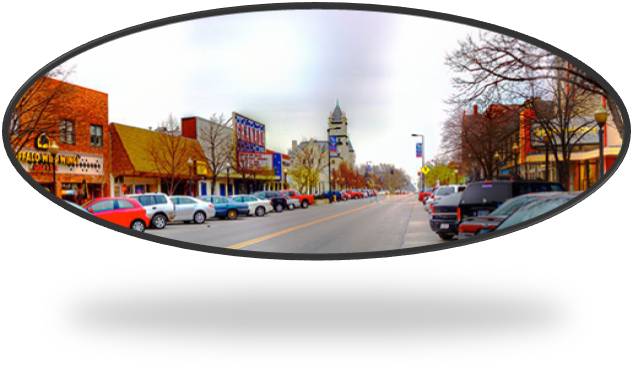
Learn what your city offers and what its limits are. For example, if you live in a bigger city, your chances of finding a market that sells ingredients for your cuisine are high. Also, if the city has colleges and these universities with international students, then you are lucky. Again, you probably will find some international markets or restaurants in your city. But frankly, don’t expect to find Iskender kebab in Idaho, or grape leaves in a market in Mississippi. However, one thing I learned about America is that it can surprise you. So, I cannot speak for sure.
ELECTRONICS
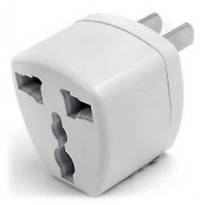
Do not bring your electronics here other than your computer and phone charger (if you need to). Because of the voltage difference, your electronic devices will break down. While it is 220-230 V in most European, African and Asian countries, it is 120 V in the US (https://www.worldstandards.eu/electricity/plug-voltage-by-country/). It happened to me with my toothbrush charger, hair straightener and epilator. First they worked slowly, then they completely stopped working. Besides, you will need a converter (see the image) if you are using a device from your country in the US.
EXPENSIVE HEALTHCARE
Do you remember those days that you had a migraine or persistent stomachache and you couldn’t help and went to emergency room? Well… You can’t do that in this country unless you are wealthy enough. Let’s look at this hospital bill of Peter Drier, 37, who had a neck hernia surgery in 2013:

You can read his full story here: https://www.nytimes.com/2014/09/21/us/drive-by-doctoring-surprise-medical-bills.html
As you can see ‘ER General’ Says $976. Let’s say your insurance will cover half of it. You still will need to pay about 500$. Also, let me remind you, monthly insurance payments vary but they can go from 150$ to 500$ a month. So, please do not get sick in the US.
Dentists are also another story. These numbers are taken from the website: http://www.phoenixendodontist.com/blog/root-canal-cost-vs-cost-of-implant
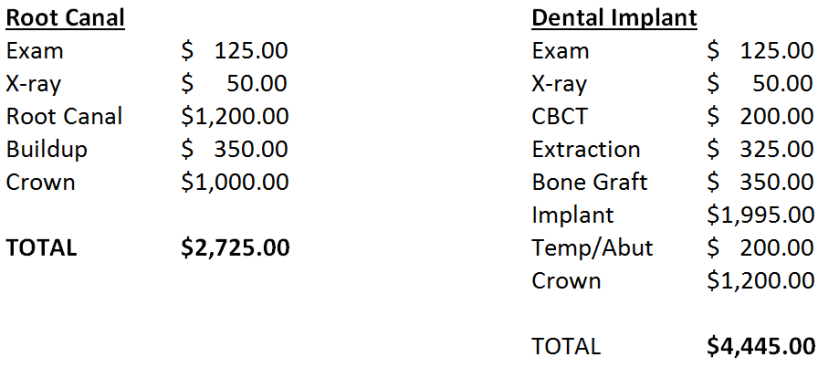
The most pricey ones are implants, as you all know. So, let’s look at this comparison:

As you can see, there is a huge gap between the medical costs in the US and in other countries. One might argue that the equipment used is the highest technology and that is why the costs are high. Although I believe this is partly true, there is also the fact that hospitals are trying to find ways to get more of your money. If you are rich, you get the best treatment. If you are poor, you might get a below average treatment and we don’t care if you die in 10 years. I’m not talking about doctors or nurses here, I’m talking about the health system. Insurance is also such a complicated issue that (deductibles, in network versus out of network, HMO PDO plans, etc) I still have many questions and confusions even after 6 years I spent here.
BE AWARE OF SCAMS
When you are looking for a room to rent or a car to buy, be aware of scams. They will try to get your money or credit card information by sending genuine-looking emails. Especially with Craigslist, you have to be extra careful. One of the ways you can understand if the email is scam or not, scam ones tend to have too many personal details or many grammar or spelling mistakes. Let’s look at this example:
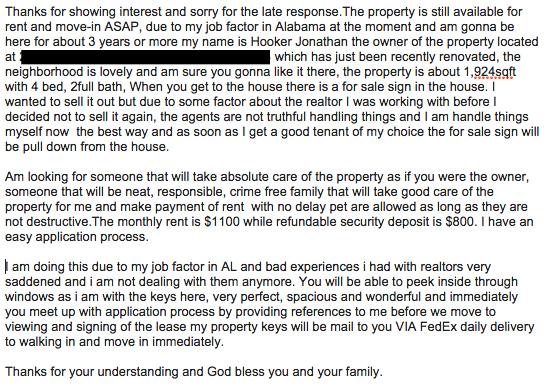
As you can see from this email, the person is in Alabama and he will ‘mail’ the keys to them once the buyer sends the security payment. Do not fall for this, my friends. No realtor, no landlord will ask for your money without meeting face to face. They would NEVER mail you the keys, either. Look at all the grammar mistakes he made! Especially in the last paragraph: “My job factor” “very saddened (without ‘I am’)” “very perfect (no native will say this)” “you meet up with application process?? (haha application process is a person’s name I guess)” “my keys will be mail to you (Wrong passive voice usage)” and nobody will use “God” in their ads. This is also a big red flag.
Another thing that you should be careful about is the phone calls you will get while in the US. I remember one time a person called me and said they were from “Credit Card Protection Services” and my card needed to be protected. They had a jingle and everything when they put me on hold. They sounded real! But then he insisted on learning my credit card number. I was trying to be polite but at that moment I understood that they were just a scam.
Your phone or internet company, maybe AT&T, Xfinity, etc. They will keep calling you as well. They will try to convince you to upgrade your plan, which means you will have to pay more. I remember when I first moved in the US, I got a call and the person was speaking English with a heavy Indian accent and he was so fast that I had no idea what he was talking about. After saying ‘Could you repeat please?’ like 2 times, I gave up and I started to say ‘Yes’ to everything he said. After about 3 and a half minutes, we hung up. Oh Lord, at that moment, I was so relieved. Well… The following month my telephone bill came and it was 250$. Apparently I had upgraded my internet and phone to the most expensive plan!!! It was painful to call them back and fix everything again.
LEARN ABOUT YOUR VISA (STATUS) AND ITS RESTRICTIONS
Some students come here with the wrong idea that they can both go to school and work. For student visas J-1 and F-1 you cannot work except campus employment. There is also a myth that your SSN (Social Security Number) allows you to work legally in the US. Again, this is a myth. If you are working without a valid work permit, you will get in trouble. People who are caught working illegally are deported and they can never come back to the US again. Please read the below link carefully:
https://www.uscis.gov/working-united-states/students-and-exchange-visitors/students-and-employment
LEARN ABOUT AMERICAN CULTURE
Before you come tho the US, you have to learn about American culture. While most western countries have similar cultural elements with Americans, when you compare Asian, African, Latin and Middle Eastern culture to America, you get a very different picture. I can only speak for my own cultural experience, of course.
- Americans prefer indirect communication in one sense and direct one in another. For example, it is not OK to ask about one’s salary, their personal life or their illness. You cannot comment on their hair looking messy or the pimple on their nose (unless they are your best friends). Before giving any criticism, you have to make sure that your words are encouraging and friendly. While discussing about racism, gender inequality, you have to be extra extra careful not to offend anybody. On the other hand, when they ask a question, they usually want a straight answer. They appreciate honesty. Let me give you a funny example. My first year in the States, we went to a bar with my friends from Geology department. My friend asked me if I wanted a beer. Because I was culturally programmed that way, I said ‘No, thanks’ Even though I would, of course, want a free beer! (duh) In Turkey, when someone offers something, it is polite to refuse it for the first time. That’s why you should keep offering till the person finally says yes. Well, after my first ‘No’ my friend said ‘OK’ and just left!!! Haha. I was like: “But… But…How about my beer??”
- Americans will have this distance from you that is called “personal bubble”. Forget about getting intimate on the train, in the movie line or restaurants. Forget about giving a warm friendly kiss to your friend on the cheek. Forget about giving random hugs to your colleagues. Oh and of course, forget about hand jokes including hitting on the head or back. My American friends walking down in Taksim Square, Istanbul were so confused with the fact that guys were walking arm in arm, girls were holding hands but they weren’t gay or lesbian. They were just showing friendly affection. Also, not only at work or school but be aware of the personal bubble in the customs at the airport. One day, one of my students with a very low level of English was trying to tell the customs officer her purpose of visit. The envelope that she handed to the officer included some complicated paper work. So, my student wanted to help and leaned towards the officer and put her arm through in the glass. That moment was the scariest memory of her. The officer went for his gun in a tiny fraction of time and yelled a ‘Put your hands up!’. She was questioned for half an hour after this incident.
- Most Americans are religious. All Protestant denominations accounted for 51.3%, while the Catholic Church by itself, at 23.9% is the largest individual denomination. God is the Father, Jesus Christ is the Son and there is Holy Spirit. This is what they call ‘Trinity”. In Catholic belief, Virgin Mary is holy. Christians’ holy book is holy Bible and they worship every Sunday at church. Unfortunately, I’m not a very knowledgeable person when it comes to religion, but please do some research before you come to the States. I highly recommend going to church one day, it is a remarkable, interesting experience.
- When you are driving, if a police officer stops you, DO NOT LEAVE YOUR CAR. Pull your car off the road, stop your engine and wait. There might be an awkward 5 minutes that you are sitting in your seat and the officer is sitting in his seat. What he is doing is that he is communicating with the main office and trying to gather information about your license plate before he talks to you. Also, don’t even try bribing. Bribery is one of the biggest offenses in the States. You can literally go to jail.
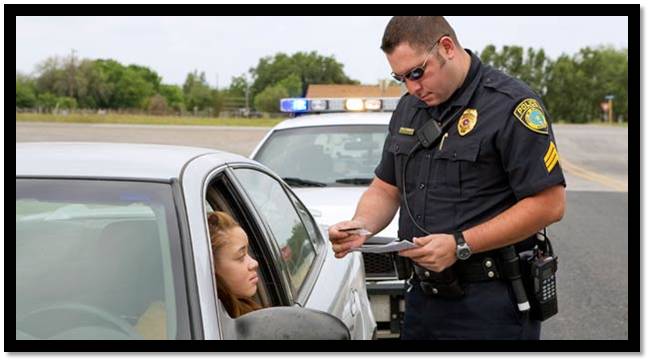
- Americans love socializing and entertaining people. You will find yourself eating and drinking out a lot. Watch those pounds on the scale! I have personally gained 22 pounds (10 kilos) here! Their burger, fries, BBQ and pizza are the best! Make sure you exercise daily! Although Americans are famous for the high obesity rates, they are also aware of self care. Most Americans that I met don’t smoke, and more than half of it exercise daily. It is such a great motivation (!) when you open your mouth to eat that juicy greasy slice of pizza, you see those runners outside running in snow with their perfect bodies. Another reason why it is easy to get fat here is the amount of variation. Variety of snacks, alcohol, soups, sauces, Indian food, Viatnemese Pho, Chinese dim sum, Korean BBQ, Italian lasagna, Brazilian steak… You want to try all. Then you get fat.

I hope this article will help you before your adventure begins in the USA or in another country! Make the most of it! Many wonderful memories are awaiting! Enjoy this incredible experience 🙂
Hoşçakalın!
-Ece
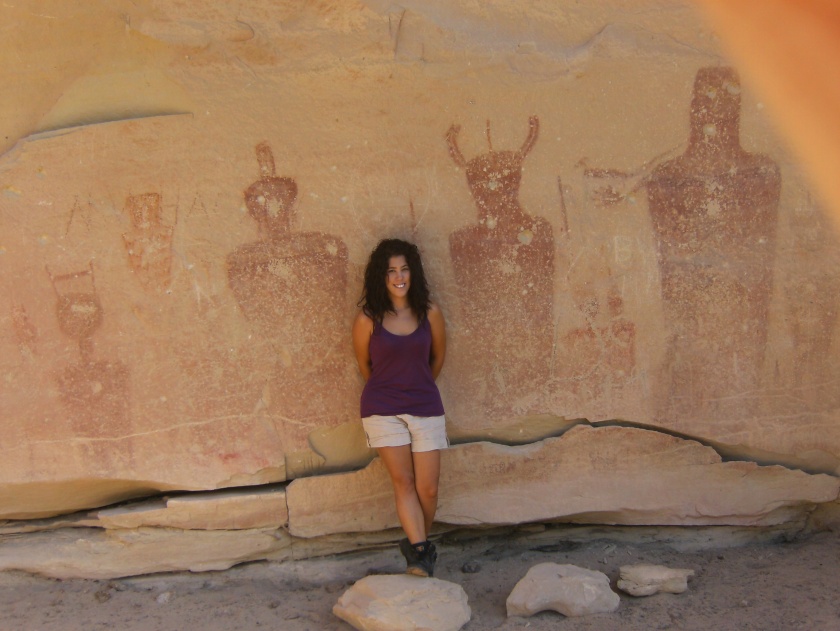












Wow, what a thorough briefing for anyone considering a move to the US! I wish someone had shared some similar insights when I first moved to France — way back before the birth of the internet. So many of the expat’s challenges are the same the world over but you really have no clue how hard it is until you’ve tried it. Sounds like you have figured out a lot of stuff on your own. Congrats and ‘bonne continuation!’
LikeLiked by 1 person
Thank you so much! This is why I wanted to share. Hopefully this blog will help expats and international students a bit. Hope all is well in France!
LikeLiked by 1 person
Contains helpful information.
LikeLike